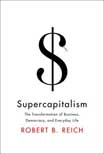Reich may be correct that these efforts enable corporations to make flashy but small commitments that distract from the bigger picture, and Kuttner correct that business interests within the Democratic Party have prevented it from mounting a robust defense the role of government in managing capitalism to make it work for most Americans. But neither lay out any alternative political, or organizing, path by which we might build enough power to confront the ills of supercapitalism.
Neither of these books, unfortunately, has much to say about how to build a politics to win the kinds of changes they propose. Kuttner and Reich both suggest that progressive politicians would be better off making the arguments that they do (even if they are called “anti-capitalist” by The Economist). And Kuttner calls for Democrats to adopt a “politics of transformation” that would go beyond the “merely palliative,” small-bore steps that characterized the Clinton administration, and beyond bipartisanship in hopes of a sustained period of one-party rule in which they could rewrite the playbook.
They don’t lay out even the slightest hints of a path for doing this — especially given the overwhelming power of corporate lobbying, with Democrats as well as Republicans, that they portray so well, or how unlikely it seems that Democrats could build a 60-seat majority in the Senate on a much more radical platform. As a result, while they are in many ways optimistic in tone, both books have an essential pessimism about possibilities for change.
And neither pays attention to what could take place at a local level that might provide a base for broader change. Because they believe that the negative impacts of the changes at the national level overwhelm communities, they don’t spend time examining grass-roots efforts beyond Reich’s critique of the WalMart campaign.
But maybe there are some bright spots out there, or at least some building blocks. Early in the presidential campaign, the Center for Community Change and community-based allies from around the country convened the Heartland Presidential Forum in Iowa, at which nearly 4,000 people from all around the country heard community leaders talk to the Democratic candidates for president about the harms of supercapitalism (although they didn’t use these words, they talked about foreclosures and plant closures tearing up their neighborhoods), and the community values they want candidates to support.
John Edwards’ campaign was largely organized around the themes of that forum, and of these two books. He connected the dots between corporate influence over our democracy, the insecurity of the middle and working classes, and the scourge of poverty (and was widely attacked in the mainstream media for doing so). After Edwards dropped out, and the campaign veered into the “silly season” of attacks between Clinton and Obama, the media — and, at their low points, the campaigns themselves — tended to focus on the differences between segments of the Democratic base, nominally pitting “hard-working white Americans” against people of color and immigrants, and against upper-middle-class progressives.
But for Democrats around the country preparing for the November elections, the analyses of the Bobs and the work of community organizers have a lot to contribute. The real challenge is to combine the day-to-day work of local organizing (which demands tangible results along the way) with the long-term work of bringing people together around a vision that restores the values of democracy and fairness to the center of our political life. In that effort, it’s worth taking a little time off from knocking doors (though not too much time before November) to read the Bobs.





Comments